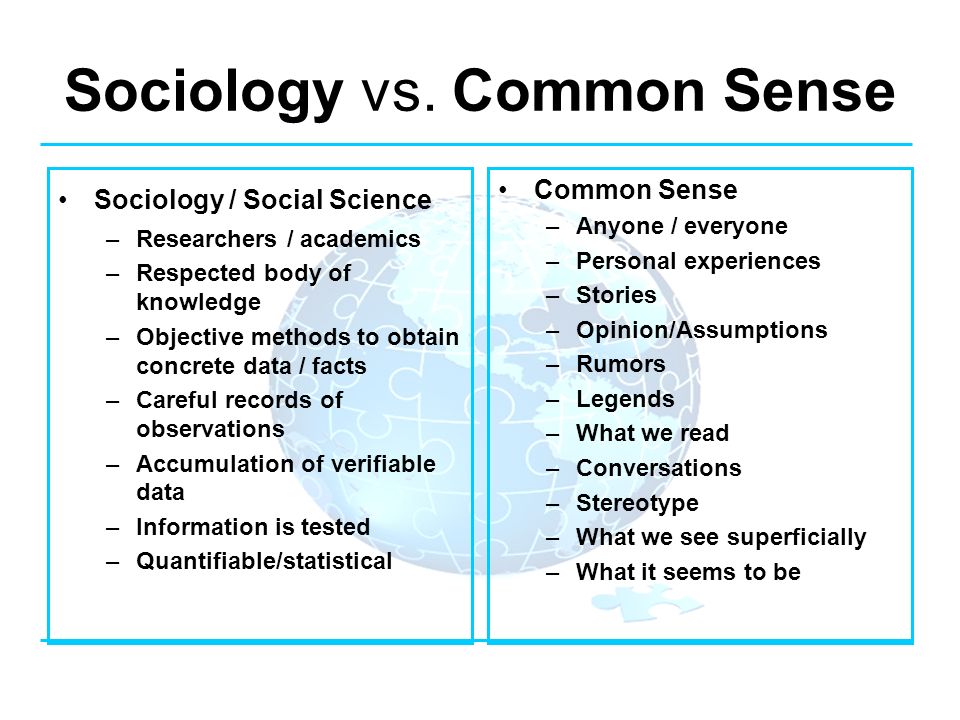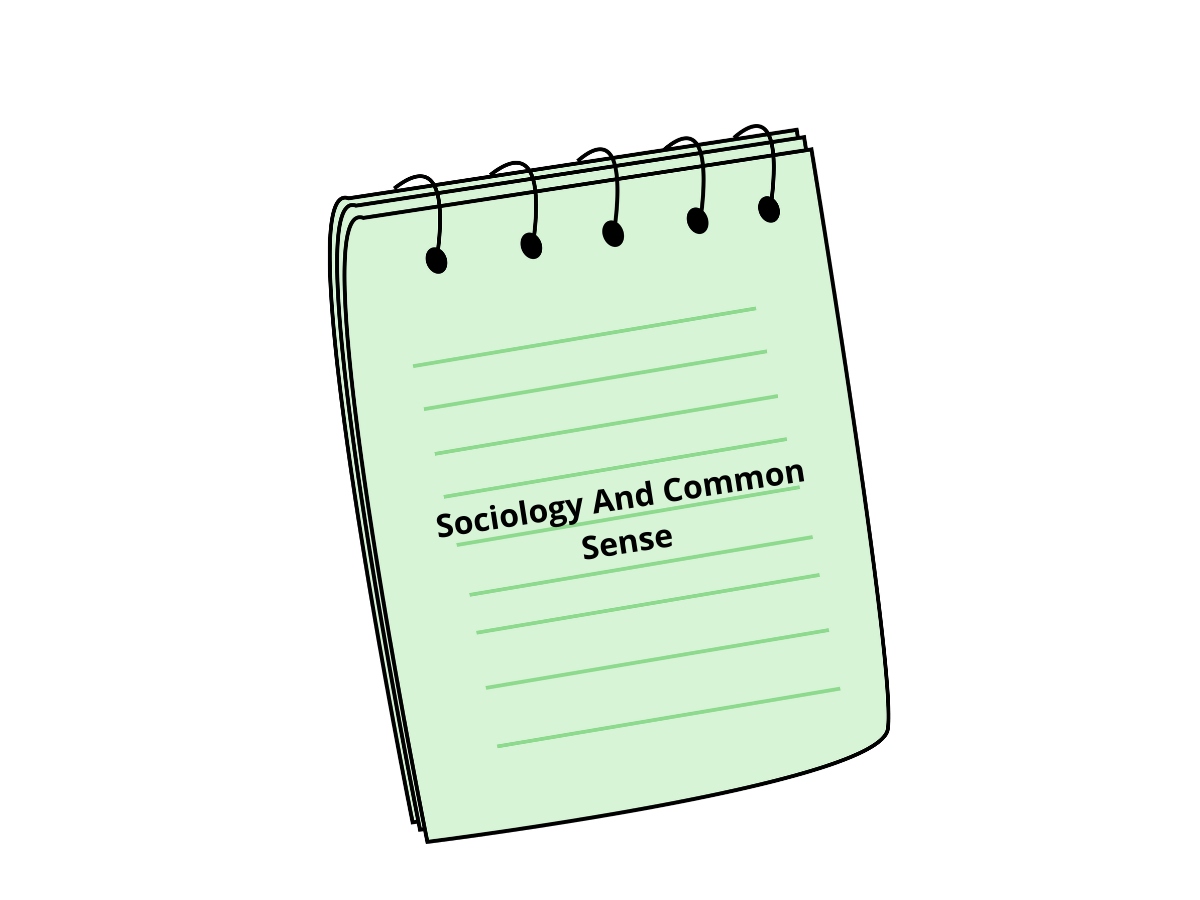We often take our social world for granted. We navigate our daily lives with an unspoken understanding of social norms, expectations, and behaviors. It’s like an unwritten manual guiding our interactions, from how we greet each other to how we behave in public spaces. But is this instinctive understanding of the social world truly just “common sense”? That’s where sociology steps in to challenge our assumptions and reveal a deeper, more complex reality.

Image: triumphias.com
Sociology, the study of human society and social interactions, goes beyond surface-level observations and delves into the intricate web of factors that shape our lives. It explores how our individual experiences are intertwined with the broader social structures and forces that influence our choices, behaviors, and beliefs. While common sense offers a kind of everyday navigation system, sociology provides a rigorous, analytical lens for understanding the complexities of our social world.
Beyond Common Sense: The Power of Sociological Perspective
Sociology’s unique contribution to understanding our world lies in its ability to move beyond our personal experiences and assumptions. It challenges us to question why things are the way they are and to examine the underlying social structures that shape our lives. For example, common sense might tell us that individuals are solely responsible for their success or failure. But sociology reveals how external factors like socioeconomic status, access to education, and systemic discrimination can significantly impact individual outcomes.
Sociology also brings to light social patterns and trends that may go unnoticed in our daily lives. Through systematic research and analysis, sociologists can identify disparities in wealth, healthcare, and education, reveal the impact of social change on different groups, and uncover the complex interplay of social forces that drive individual and collective actions. This deeper understanding helps us move beyond simplistic explanations and engage in more nuanced and informed discussions about social issues.
Exploring the Sociological Framework
Sociology employs various theoretical frameworks to make sense of the social world. These frameworks provide a set of lenses through which we can analyze social phenomena. Some key sociological perspectives include:
Functionalism:
Functionalism views society as a complex system with interconnected parts, each contributing to the overall functioning of the whole. This perspective emphasizes social stability and the importance of shared values and institutions.

Image: thegeneralfacts.com
Conflict Theory:
Conflict theory, on the other hand, sees society as characterized by power struggles and inequalities between groups. This perspective emphasizes the role of social conflict in driving social change and transformation.
Symbolic Interactionism:
Symbolic interactionism focuses on the ways in which individuals create meaning through interaction, symbols, and communication. It highlights how our understanding of the world is shaped by our interactions with others and the shared meanings we attach to symbols and gestures.
Feminist Theory:
Feminist theory examines the ways in which gender shapes social structures, power relations, and experiences. It critiques the social construction of gender and seeks to challenge gender inequalities.
Postmodernism:
Postmodernism challenges grand narratives and universal truths, emphasizing the fluid and fragmented nature of knowledge and identity. It encourages a focus on individual experiences and the subjective interpretation of reality.
Beyond the Textbook: Sociology in Action
Sociology is not merely an academic pursuit confined to classrooms and research labs. It has direct implications for our personal lives, our communities, and our world. Here are just a few examples:
Understanding Social Issues:
Sociology sheds light on complex social issues such as poverty, crime, inequality, and racial injustice. It helps us understand the root causes of these problems, identify effective solutions, and advocate for social change.
Improving Communication and Social Skills:
By studying social interactions and communication patterns, sociology offers valuable insights into how to improve our communication skills, navigate diverse social contexts, and build stronger relationships.
Informing Public Policy:
Sociological research informs the development of public policies aimed at addressing social problems, promoting social justice, and improving the well-being of individuals and communities.
Trends and Developments in Sociology
Sociology is a dynamic field constantly evolving to address new challenges and opportunities. Here are some current trends:
The Rise of Social Media:
The increasing prominence of social media presents both challenges and opportunities for sociologists. Social media platforms provide rich data sources for studying social interactions, networks, and cultural trends. However, sociologists also grapple with the ethical considerations of data privacy and the potential for online bias and misinformation.
Global Inequality and Social Change:
Globalization has intensified inequalities, creating new forms of social stratification and power dynamics. Sociologists are investigating the impact of globalization on various social groups, including migrants, refugees, and the global working class, as well as the rise of transnational social movements.
Environmental Sustainability:
Sociologists are exploring the relationship between social structures, environmental degradation, and sustainable development. This includes examining the role of consumption patterns, environmental justice, and the social implications of climate change.
Tips and Expert Advice for Navigating the Social World
The insights gained from sociological studies can empower us to navigate our social world with greater awareness and understanding. Here are some tips for applying sociological thinking to your daily life:
- Question Your Assumptions: Be critical of the “common sense” explanations you encounter. Ask yourself: “Why do I believe this? What evidence supports this? What are the alternative perspectives?”
- Seek Out Different Viewpoints: Engage with diverse perspectives and challenge your own biases. Read books, articles, and media from a range of viewpoints and be open to new ideas.
- Observe Social Patterns: Pay attention to social patterns and behaviors in your everyday life. What are the unwritten rules that govern social interactions? How do these patterns differ depending on context?
- Think Systematically: Recognize that individual actions are shaped by broader social structures. Consider how factors like gender, race, class, and social institutions influence your life choices and experiences.
- Empower Yourself Through Action: When you see inequalities or injustices, take action. Use your voice, support organizations working for positive change, and participate in social movements to create a more equitable and just society.
Frequently Asked Questions about Sociology
Q: What is the difference between sociology and psychology?
Sociology focuses on the social forces that shape individual behavior, while psychology examines individual thoughts, feelings, and behaviors. Sociology explores the broader context within which individuals live, while psychology delves into the inner workings of the human mind.
Q: How can I get involved in sociology?
There are many ways to engage with sociology. You can pursue a formal education in sociology, read popular sociology books and articles, participate in social movements, or simply observe and analyze social interactions in your everyday life.
Q: Is sociology relevant to my life?
Absolutely! Sociology helps us understand the complexities of our social world and how our individual experiences are shaped by broader social forces. By deepening our understanding of society, we can become more engaged citizens, effective communicators, and agents of positive change.
Is Sociology Common Sense
Conclusion: Embracing the Sociological Lens
Sociology is more than just a subject in a textbook; it’s a lens through which we can view the world in new and impactful ways. By challenging our assumptions, seeking out diverse perspectives, and engaging in critical analysis, we can move beyond common sense and gain a deeper understanding of the intricate web of social forces that shapes our lives and our world.
Are you interested in learning more about sociology? Share your thoughts and questions in the comments below!






